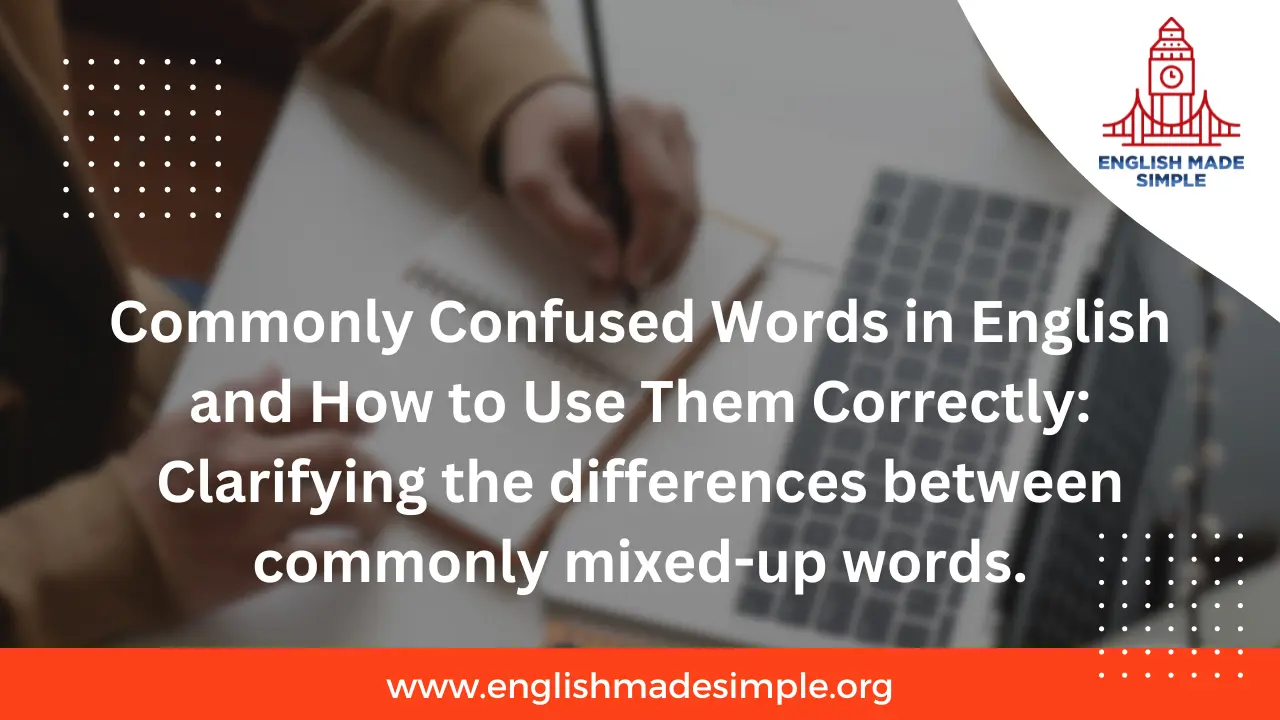
Commonly Confused Words in English and How to Use Them Correctly: Clarifying the Differences Between Commonly Mixed-Up Words
English is a language rich with vocabulary, and it’s easy to confuse words that look or sound similar but have different meanings. Understanding these commonly confused words is crucial for effective communication. This blog will clarify the differences between frequently mixed-up words and provide tips on how to use them correctly.
Affect vs. Effect
Affect (verb):
- Meaning: To influence something.
- Example: The weather can greatly affect your mood.
Effect (noun):
- Meaning: The result of an influence.
- Example: The effect of the new law was immediate.
Tip: Remember that affect is usually a verb (action), and effect is usually a noun (result).
Their vs. There vs. They’re
Their (possessive pronoun):
- Meaning: Belonging to them.
- Example: Their house is at the end of the street.
There (adverb):
- Meaning: In or at that place.
- Example: Please put the book over there.
They’re (contraction of they are):
- Meaning: They are.
- Example: They’re going to the concert tonight.
Tip: Use “their” for possession, “there” for location, and “they’re” when you mean “they are.”
Your vs. You’re
Your (possessive pronoun):
- Meaning: Belonging to you.
- Example: Is this your pen?
You’re (contraction of you are):
- Meaning: You are.
- Example: You’re going to love this movie.
Tip: If you can replace the word with “you are” and the sentence still makes sense, use “you’re.”
Then vs. Than
Then (adverb):
- Meaning: Refers to time or sequence.
- Example: We went to the park, and then we had ice cream.
Than (conjunction):
- Meaning: Used for comparisons.
- Example: She is taller than her brother.
Tip: Use “then” for time or order, and “than” for comparisons.
To vs. Too vs. Two
To (preposition):
- Meaning: Indicates direction, place, or position.
- Example: I’m going to the store.
Too (adverb):
- Meaning: Also or excessively.
- Example: I want to go too. / It’s too hot outside.
Two (number):
- Meaning: The number 2.
- Example: She has two cats.
Tip: “To” is for direction, “too” means also or excessively, and “two” is the number.
Loose vs. Lose
Loose (adjective):
- Meaning: Not tight or free from restraint.
- Example: The shirt is too loose.
Lose (verb):
- Meaning: To misplace or be deprived of something.
- Example: Don’t lose your keys.
Tip: “Loose” means not tight, and “lose” means to misplace.
Complement vs. Compliment
Complement (noun/verb):
- Meaning: Something that completes or goes well with something.
- Example: Her scarf complements her outfit.
Compliment (noun/verb):
- Meaning: A polite expression of praise or admiration.
- Example: He gave her a compliment on her cooking.
Tip: “Complement” means to complete, and “compliment” means to praise.
Principal vs. Principle
Principal (noun/adjective):
- Meaning: The head of a school or main/most important.
- Example: The principal announced a new policy. / The principal reason is clear.
Principle (noun):
- Meaning: A fundamental truth or belief.
- Example: He is a man of strong principles.
Tip: “Principal” can be a person or the main thing, while “principle” is a rule or belief.
Accept vs. Except
Accept (verb):
- Meaning: To receive or agree to something.
- Example: She accepted the job offer.
Except (preposition/conjunction):
- Meaning: Not including or other than.
- Example: Everyone is coming except John.
Tip: “Accept” means to receive, and “except” means to exclude.
Desert vs. Dessert
Desert (noun):
- Meaning: A barren area of land with little rainfall.
- Example: The Sahara is a vast desert.
Dessert (noun):
- Meaning: The sweet course eaten at the end of a meal.
- Example: We had ice cream for dessert.
Tip: Remember that “dessert” (the sweet treat) has two “s” letters because you always want more sweets.
Farther vs. Further
Farther (adverb/adjective):
- Meaning: Refers to physical distance.
- Example: We drove farther than we expected.
Further (adverb/adjective):
- Meaning: Refers to metaphorical or figurative distance.
- Example: We need to discuss this further.
Tip: “Farther” for physical distance, “further” for figurative distance.
Advice vs. Advise
Advice (noun):
- Meaning: Guidance or recommendations.
- Example: She gave me good advice.
Advise (verb):
- Meaning: To give advice.
- Example: I advise you to study hard.
Tip: “Advice” is the guidance you give, and “advise” is the act of giving it.
Its vs. It’s
Its (possessive pronoun):
- Meaning: Belonging to it.
- Example: The cat licked its paw.
It’s (contraction of it is or it has):
- Meaning: It is or it has.
- Example: It’s raining outside.
Tip: If you can replace the word with “it is” or “it has,” use “it’s.”
Conclusion
Understanding the differences between commonly confused words is essential for clear and effective communication. By paying attention to the context and practicing regularly, you can master these tricky pairs and improve your writing and speaking skills. Remember to use the tips provided to help you remember which word to use and when. Happy learning!
